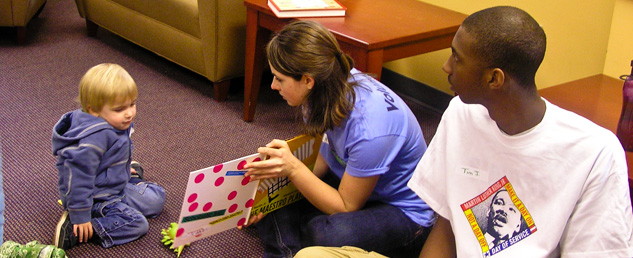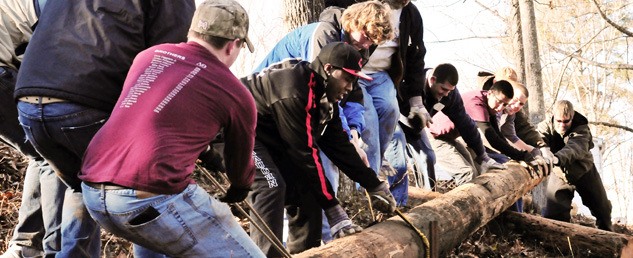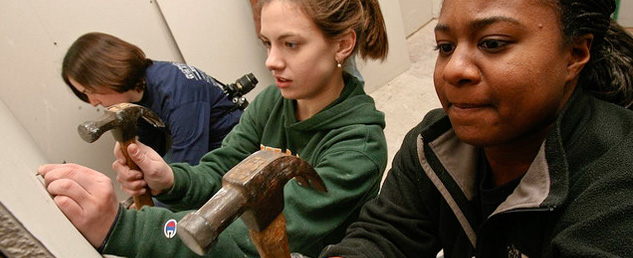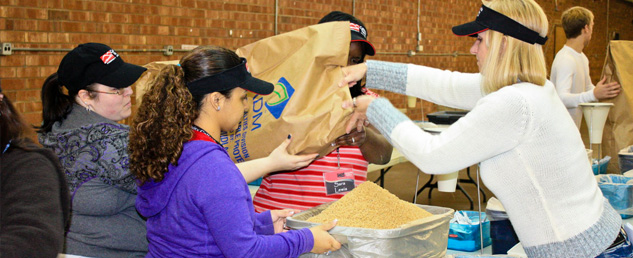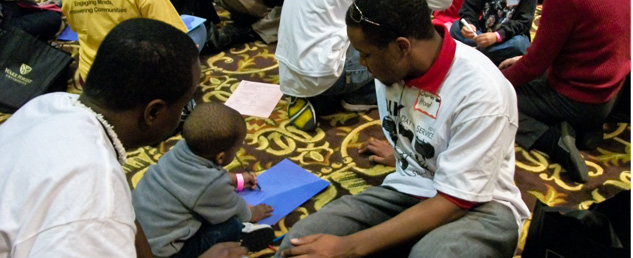NC Campus Compact
Campus Box 2257
Elon, NC 27244
Phone: 336-278-7278
Email: nccc@elon.edu
Follow us:
|
Sign up for Our Email Newsletter |
|
|
|
Campus Election Engagement Project
Published
October 31, 2016

Do you see ways to improve your community? To make our state, nation, and world better?
Are you frustrated by the state of our politics and our civic discourse?
How can you be the change you wish to see?
You can take the lead! Join NC Campus Compact and the NC Institute of Political Leadership to explore Pathways to Civic Leadership – a special workshop for college students.
Learn how you can align your passion for community and social change with professional and career pathways, including political office. Meet special guests who’ve made their way as elected leaders, activists, and change agents.
Saturday, February 25, 2017
NC State University
Talley Student Union
9:30 a.m. – 4:00 p.m.
REGISTRATION NOW OPEN!
(Registration ends on February 10.)
$50/pp (includes light breakfast and lunch)
Talk with your student leadership office to learn if funding is available.
Questions? Email Chad Fogleman (cfogleman2@elon.edu) or call 336-278-7278.
Published
September 23, 2016
On September 10, nearly 60 student leaders from 17 NC campuses gathered at Elon University for a full Saturday of training on best practices for non-partisan voter engagement. In whole group and break-out sessions led by veteran organizers from Democracy NC, the Campus Vote Project, and NC PIRG, students dug into such topics as: working with your local board of elections, effective use of social media, and using voter pledges to get-out-the-vote.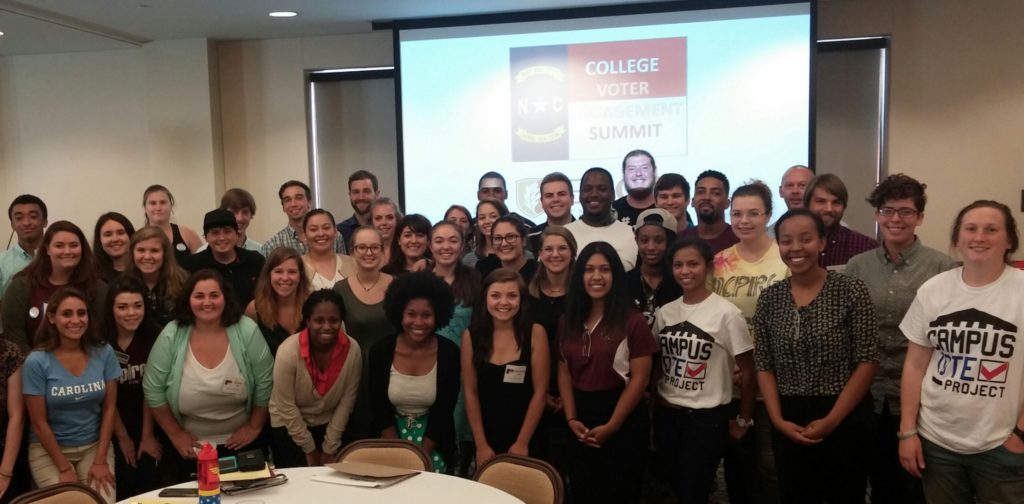
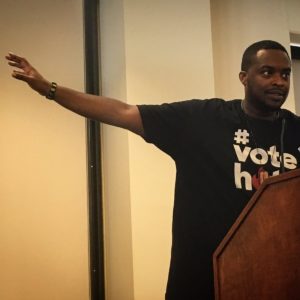 Democracy NC organizer Marcus Bass kicked off the morning by telling the story of voting in the United States, drawing a line from the Founding Fathers, through the women’s suffrage and civil rights movements, to the passage in 1971 of the 26th Amendment granting 18-year-olds the right to vote, and finally to the students present in the room. Democracy NC organizer Marcus Bass kicked off the morning by telling the story of voting in the United States, drawing a line from the Founding Fathers, through the women’s suffrage and civil rights movements, to the passage in 1971 of the 26th Amendment granting 18-year-olds the right to vote, and finally to the students present in the room.
Bass declared, “This is what democracy looks like.”
Mike Burns, national director of the Campus Vote Project, provided an update on the current North Carolina voting rules in the wake of the federal court of appeals decision. Burns also pointed out key supports for college student voting. The U.S. Supreme Court’s decision in Symm v. U.S. held stricter 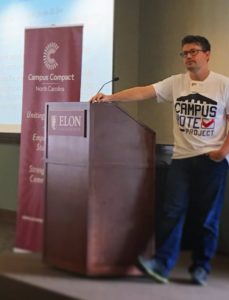 residency standards for college students are unconstitutional, thus protecting students’ choice to register to vote in a campus community or a parent’s residence (but NOT both!). Burns also noted the Higher Education Act’s mandate that colleges and universities “make voter registration forms widely available your students and distribute those forms individually.” In a subsequent session, Burns dispelled some common myths that might deter students from registering in NC. residency standards for college students are unconstitutional, thus protecting students’ choice to register to vote in a campus community or a parent’s residence (but NOT both!). Burns also noted the Higher Education Act’s mandate that colleges and universities “make voter registration forms widely available your students and distribute those forms individually.” In a subsequent session, Burns dispelled some common myths that might deter students from registering in NC.
During her session on local issues and social media, Democracy NC staffer Jen Jones asked students why they’d given up a Saturday to learn about voter engagement, and live-streamed their comments.
“We came to be a resource for others because they don’t teach you how to do this in high school,” said one Western Carolina student. “It’s not something everyone knows how to do, especially if you’re a kid, eighteen, coming to a big campus you don’t know how to get involved.”
“We’re the biggest population since the baby boomers,” said another participant. “If anyone is going to make a change it will be our generation.”
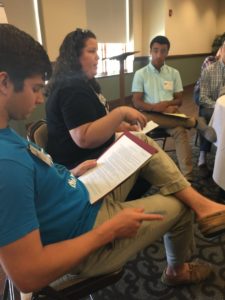 Students learn tips for working with their local board of elections. During lunch, students from several schools shared lighting presentations of work they were doing. Among the presenters, CEEP Election Engagement Fellow Timira Conley (NCSU) shared the Pack the Polls initiative, and Elise Wilson (UNCW) shared the schedule of events planned for UNCW Votes week. Elon University’s Vote Everywhere Ambassadors June Shuler and Gabby Vance shared their campus commitment to a cross-departmental collaboration in the Elon Votes! project.
Together, the student leaders who attended the summit have a chance to engage more than 200,000 students enrolled collectively at the 17 colleges and universities represented.
More information about the event can be found via Twitter hashtag #NCvoter16. More resources for campus voter engagement can be found on the CEEP-NC webpage. For general voter info visit Democracy NC’s www.ncvoter.org.
Sponsoring partners included the Andrew Goodman Foundation, Campus Vote Project, the Campus Election Engagement Project, Democracy NC, Elon University’s Kernodle Center for Service-Learning and Community Engagement, NC PIRG, and NC Campus Compact.
Published
September 7, 2016
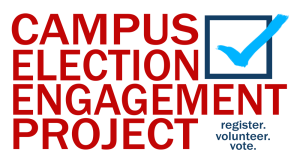 This summer — with support from the national Campus Election Engagement Project and Ben & Jerry’s “Democracy in Your Hands” initiative — we welcomed 5 student leaders to our EE Fellows Program. They joined a group of 12 student fellows who began working last spring to support non-partisan, campus-based efforts to engage student voters this fall and to institutionalize programs and processes to sustain future democratic participation on their campus. Learn more about these democratically-dedicated election energizers below. This summer — with support from the national Campus Election Engagement Project and Ben & Jerry’s “Democracy in Your Hands” initiative — we welcomed 5 student leaders to our EE Fellows Program. They joined a group of 12 student fellows who began working last spring to support non-partisan, campus-based efforts to engage student voters this fall and to institutionalize programs and processes to sustain future democratic participation on their campus. Learn more about these democratically-dedicated election energizers below.
 DaQuane Cherry DaQuane Cherry
Central Piedmont Community College
Advisor: Jenn Marts
DaQuane is a second-year student at Central Piedmont CC. He hails from Elizabeth City, NC and is studying marketing. DaQuane is an SGA Senator and a member of the Rotoract service club, and he was one of the students who met with Vice President Joe Biden when he visited CPCC earlier this year.
 Itane’ Coleman Itane’ Coleman
UNC Greensboro / UNCG Votes
Advisor: Kristina Snader
Itane’ is a senior double-majoring in political science and African-American studies. Originally from Charlotte, NC, Itane’ is a social justice and diversity peer educator and a University Marshal. This summer, she was an intern with Democracy NC’s “Democracy Summer.”
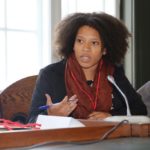 Timira Conley Timira Conley
NC State University / Pack the Polls
Advisor: Melissa Green
Timira is a junior double-majoring in political science and foreign languages (Arabic). Originally from Durham, NC, Timira is currently serving as the Director of Diversity Outreach for NCSU’s Student Government, and she is a former intern with Common Cause NC.
 Devon Hester Devon Hester
UNC Pembroke / UNCP Votes
Advisor: Dalton Hoffer
Devon is a sophomore double-majoring in history and political science. Originally from Hope Mills, NC, Devon is an SGA Senator and officer in UNCP’s political science club.
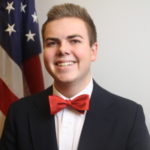 Luke Perrin Luke Perrin
NC State University / Pack the Polls
Advisor: Laura Stott
Luke is a sophomore majoring in political science. Originally from Hickory, NC, Luke is Student Senator and chairs the Student Government’s Committee on Government Regulations. He is also active in the political science club and is a University Scholar.
 Cassie Radcliffe Cassie Radcliffe
UNC Wilmington / UNCW Votes
Advisor: Erin Williamson
Cassie is a senior double-majoring in political science and international studies. Originally from Gainsville, Florida, Cassie has served in student government as VP of community service, was on the leadership council of Seahawks Links, and held a leadership role in a regional association of residence halls.
Published
September 7, 2016
The national Campus Election Engagement Project (CEEP) has released its non-partisan candidate guides to the U.S. Presidential Race. CEEP produced both a 2-party candidate guide (available in English and Spanish) and a four-party guide. The group also produced a student guide to the race’s potential impact on the U.S. Supreme Court.
Find all the guides here: http://www.campuselect.org/nonpartisan-voter-guides.html
In NC, registered voters can now access their General Election ballot by using the NC Public Voter Search Tool here: https://vt.ncsbe.gov/voter_search_public/
CEEP has also shared some tips on using the candidate guides:
- Here are some ways to distribute our guides—or any others you feel that are useful, like the guides the League of Women Voters guides creates for local candidates and statewide initiatives:
- Encourage your student newspaper to use them as a starting point for their election coverage, highlighting the impact elected officials can make in student lives. Students may not read outside newspapers, but they do read their campus paper, and if that paper makes the election salient, there’s a far greater likelihood that students will participate.
- As discussed in our guide for how student newspapers can help engage their campuses, these campus newspapers can do a huge amount to thoughtfully cover candidates beyond just following the horse race, or covering campus visits. We’d be delighted if they used our guide as a start, either printing as an insert or elaborating on its themes. Various schools have done both, and the earlier you get the guides to the student paper, the more likely they’ll be able to help galvanize their engagement.
- Post them prominently on your school’s election-related website. You can then link to them through other electronic outreach.
- Get digital: Distribute them through all-campus email and social media outlets. Millennials love to spread ideas online, so distribute a link to the guides via social media networks, text-blasts, and use creative approaches like chalking your campus with links. If you can track views and let us know, we’d appreciate it.
- Distribute printed copies of the guides in students’ physical mailboxes, as Viterbo did. Or have student volunteers hand them out as part of your nonpartisan voter engagement effort. Make them a starting-point for campus conversations.
- Distribute them and use them to help spark discussions in classrooms and residence halls. The goal is not to get agreement. It’s to get students weighing in and talking about how their own values and political stands relate to those of the candidates.
- Think big: Blow the guides up in posters large enough to be visible to passing students. Display in high-traffic areas of the student union, classroom buildings, or residence halls. It’s an inexpensive way to get major visibility.
- Create your own nonpartisan guides to down-ballot races, like Secretary of State, Attorney General, Congressional and local legislative races, and local and statewide initiatives. Have students draw up these guides under the supervision of political science, communications, or honors faculty, or have the faculty create them. Distribute them in the campus, community, and online as you would the CEEP guides.
- If your local League of Women Voters is creating guides to national, state, or local election, or any other nonpartisan groups, promote and distribute them as well. Direct students to some of the websites we use to put them together, like Countable.us, Votesmart.org, Vote411.org, OntheIssues.org, FactCheck.org, Politifact.com.
- Add your own creative ideas, and let CEEP know so we can pass them on. Use the guides to create reflection however you can.
Published
August 31, 2016
The elections next fall are rapidly approaching and the people elected will make decisions about issues we care about – like jobs, the economy, college affordability and the environment. We are working to make sure that students turn out to the polls in a big way on Election Day, so we can raise our voice on the issues we care about. That’s why we are hiring organizers to run non-partisan voter registration and turnout campaigns on college campuses across the country next Fall.
Our Future. Our Voice. Our Vote.
What’s in store for our future? Will we be able to get jobs, and pay off our bills and our student loans? Will the big issues of our day, like protecting our environment, student debt, or big money in politics get dealt with, or will they keep getting kicked down the road, only to get bigger and harder to solve?
One thing is for sure, we know a better future isn’t going to happen if we just sit around waiting for it. We can’t expect our elected leaders to pay attention to the issues we care about, or for things to start moving in the right direction if we don’t make ourselves heard. That’s why we need to vote. So on Election Day we need to show up, and show up big. It’s pretty basic: If we’re going to be heard, we all need to work together, raise our voices together and vote together.
What is the New Voters Project?
For forty years, we’ve built a legacy of recruiting, training, and inspiring young people to engage in democracy. We believe that for our democracy to work, young people need to be engaged. And the first step to engaging young people is exercising their voice at the polls. The New Voters Project is the largest non-partisan, on-the-ground young voter mobilization effort in the nation. Since 1984, we have helped to register more than 1.7 million young voters and made over one million personalized get-out-the-vote contacts.The New Voters Project is a project of PIRG Campus Action.
The New Voters Project Campus Organizers will:
- Run a non-partisan voter registration and turnout campaign in a campus community. Campus Organizers recruit and train a cadre of volunteers to register 18-29 year olds, collect pledges to vote from 18-29 year olds who are already registered to vote, and contact all of these young people to turn out to vote on Election Day.
- Educate students and train new leaders. Campus Organizers teach citizenship and organizing skills. Campus Organizers also oversee an internship program, through which students can earn academic course credit for their work to boost youth voter engagement.
- Build a coalition. Campus Organizers work with student volunteers and interns to build a diverse, invested coalition of organizations and people, such as the student government, college president, College Republicans, College Democrats and others, to boost youth voter turnout.
APPLY ONLINE at http://workforprogress.org/job-board/?entry=333
SALARY & BENEFITS:
The target annual compensation for this position is $25,000. The Student PIRGs offers a competitive benefits package. We also offer an excellent training program and opportunities for advancement.
PIRG Campus Action is an equal opportunity employer and will not discriminate against any employee or applicant on the basis of race, color, national or ethnic origin, religion, age, sex, handicap, pregnancy, sexual orientation, gender identity or veteran status.
Published
August 30, 2016
NC Campus Compact builds the capacity of colleges and universities to produce civically-engaged graduates and to strengthen communities. Since 2008, our Compact has partnered with the Campus Election Engagement Project, a national, non-partisan effort to help colleges and universities involve students in the electoral process. Funding for these mini-grants is provided by the CEEP national office through Ohio Campus Compact.
MINI-GRANT PROGRAM OVERVIEW
To encourage college student election engagement, NC Campus Compact will award $500 mini-grants to select member campuses. The goal of the mini-grant program is to increase the number of college students who register and vote in the 2016 general election. Funds may be used to provide student leader stipends, facility rentals, transportation, food, supplies, materials, printing, technology services, speaker fees, or other programming expenses related to election engagement activities. All supported activities should be non-partisan and inclusive. Specifically, grantees will:
- Create a team of faculty, students, and staff to develop a non-partisan, campus-wide election engagement project and coordinate grant activities.
- Use mini-grant funds to accomplish one or more of the following objectives:
- Increase the number of students who are registered to vote.
- Provide non-partisan voter education opportunities for students to learn about voting, issues, and candidates.
- Motivate and assist students to go to the polls and vote (GOTV).
- Monitor and report on use of grant monies and outcomes of grant-supported activities.
ELIGIBILITY
In order to apply for a grant, a campus must be a current member of North Carolina Campus Compact.
KEY DATES
Mini-grant proposal early bird deadline: September 9, 2016 / Extended deadline: September 23, 2016
Grant activity period: September 1- November 8, 2016
Final Mini-grant Impact and Expense Report deadline: November 18, 2016
TO APPLY: complete the ONLINE APPLICATION FORM
Questions? Contact Chad Fogleman at cfogleman2(@)elon.edu or 336-278-7197.
Published
August 22, 2016
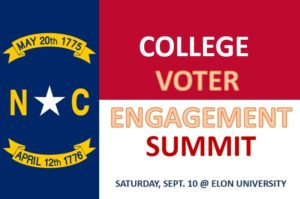 NC Campus Compact, in collaboration with other state and national partners, will host a 1-day training event for students who are leading non-partisan, student voter engagement activities at NC colleges and universities. Sessions will include updates on NC election law, training on organizing and best practices for voter engagement, and campus idea exchange. This event is geared for students who have baseline knowledge of voter engagement and are looking for more in-depth training. FREE but you must RSVP! (Box lunch will be served.) NC Campus Compact, in collaboration with other state and national partners, will host a 1-day training event for students who are leading non-partisan, student voter engagement activities at NC colleges and universities. Sessions will include updates on NC election law, training on organizing and best practices for voter engagement, and campus idea exchange. This event is geared for students who have baseline knowledge of voter engagement and are looking for more in-depth training. FREE but you must RSVP! (Box lunch will be served.)
REGISTRATION DEADLINE IS FRIDAY, SEPT. 2nd! Register now.
Learn more and connect on the Summit event page.
Sponsored by Andrew Goodman Foundation, Campus Vote Project, Democracy NC, Kernodle Center for Service Learning and Community Engagement, NC PIRG, and North Carolina Campus Compact.
|

